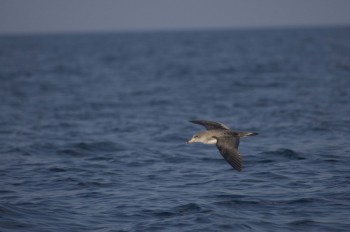David Gremillet (CEFE-CNRS, Montpellier, France) and colleagues have published in the journal Biological Conservation on movements of Scopoli’s Shearwaters Calonectris diomedea and Northern Gannets Morus bassanus off West Africa.
The paper’s abstract follows:
“Foreign fisheries massively harvest waters off West Africa, plundering local marine economies and threatening African food security. Here we warn that these fisheries might affect both juvenile and adult European seabirds during their autumn migration and at their wintering grounds. Using miniaturised GPS, satellite transmitters and geolocators, we tracked the migratory movements of 64 adult and juvenile Northern gannets (Morus bassanus) and Scopoli’s shearwaters (Calonectris diomedea) after their breeding season in the eastern Atlantic and the Mediterranean Sea, respectively. It was the first time ever that the movements of gannet fledglings were tracked with GPS accuracy. During winter (October to March) birds made extensive use of marine areas within the exclusive economic zones of Morocco, Western Sahara, Mauritania and Senegal. These juvenile and adult European seabirds are therefore dependent upon African marine resources and at risk from competition with fisheries, as well as intentional and incidental mortality by fishing gear. Those threats occur additionally to detrimental seabird–fishery interactions in Europe. There is an urgent need for improved marine conservation off West Africa, and our data demonstrating connectivity between specific European breeding colonies and African wintering areas are a major step towards stakeholder involvement.”

Cory's Shearwater at sea, photograph by Jacob Gonzalez-Solis
Reference:
Gremillet, D., Peron, C., Provost, P. & Lescroel, A. 2015. Adult and juvenile European seabirds at risk from marine plundering off West Africa. Biological Conservation 182: 143-147.
John Cooper, ACAP Information Officer, 06 January 2015

 English
English  Français
Français  Español
Español